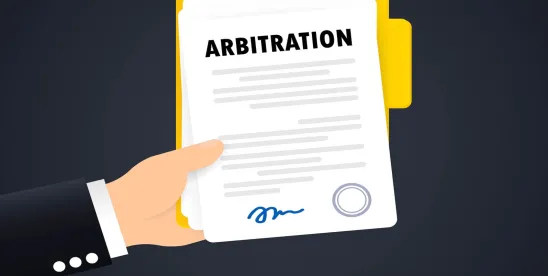Earlier this month, arbitration services provider JAMS announced that it created a new set of Mass Arbitration Procedures and Guidelines (“Mass Procedures”) for use in mass arbitrations. Like competitor American Arbitration Association’s (“AAA”) update to its mass arbitration supplementary rules (“AAA Supplementary Rules”) earlier this year, JAMS’s new procedures include some features that may mitigate some of the more abusive practices common to mass arbitrations, but do not fully eliminate the risks posed by mass arbitrations. Read on for an overview of these new procedures and the accompanying fee schedule.
Scope of JAMS’s Mass Procedures
Under Procedure 1(a), JAMS’s Mass Procedures only apply when all three of the following conditions are certified:
- The arbitration is administered by JAMS;
- The parties have agreed, either pre- or post-dispute, that the Mass Procedures apply; and
- There is a “Mass Arbitration”, defined as “75 or more similar Demands for Arbitration, or such other amount as is specified in the Parties’ agreement(s), filed against the same Party or related Parties by individual Claimants represented by either the same law firm or law firms acting in coordination.”
In a JAMS post accompanying the announcement of the new rules, particular emphasis was placed on the requirement that parties “specifically reference[]” the Mass Procedures for the procedures to apply, warning that “[c]ompanies that fail to change the terms of the pre-dispute agreements to incorporate the mass arbitration procedures, do not get the benefit of them.”
The default threshold of 75 or more similar demands is in contrast with the AAA Supplementary Rules, which provide for a 25-or-more threshold for consumer arbitration, and 100-or-more threshold for employee arbitrations. The ability for the parties to specify a different threshold is unique to JAMS’s Mass Procedures.
JAMS’s Sworn Declaration Requirement
Under Procedure 2, counsel for any claimant must include certain information about the claimant in any demand, including the claimant’s residence, email address, and a copy of the applicable arbitration agreement. More significantly, this information must be “accompanied by a sworn declaration from counsel averring that the information in the Demand is true and correct to the best of the representative’s knowledge.”
This sworn declaration requirement is similar to AAA Supplementary Rules MA-2 and is meant to address the frequent problem that claimants’ counsel will submit numerous fictitious, duplicative, or inaccurate demands with no recourse available to respondents.
Process Administrator
The Mass Procedures provide for JAMS to designate a Process Administrator to “hear and determine preliminary and administrative matters in a Mass Arbitration.” As JAMS has explained, the Process Administrator can make these administrative determinations normally done by JAMS and its National Arbitration Committee. JAMS commented that this development was prompted by the concern that “the filing of dozens, hundreds or even thousands of claims may create delays and involve significant fees,” and as such, “the process administrator can work with the parties and serve in a variety of key functions.”
The preliminary matters a Process Administrator may decide expressly include:
- “Whether the Parties have met the filing requirements of these Procedures and the applicable Rules;”
- Whether “threshold jurisdictional and arbitrability disputes are arbitrable;”
- Whether conditions precedent to arbitration have been met;
- “Whether to batch, consolidate or otherwise group the Demands or claims in the Mass Arbitration;” and
- Other non-merits issues.
In JAMS’s accompanying blog post, it was explained that “the functions carried out by the process administrator and the subsequent appointment of arbitrators makes it unnecessary to charge a filing fee for each individual demand filed,” necessitating a different fee schedule structure for mass arbitrations.
Lack of Bellwether Case Requirements
As JAMS noted in its press release, “[u]nlike other providers, JAMS does not include either mandatory mediation or test cases” in its Mass Procedures. Instead, the Process Administrator and the parties are left to choose a structure for processing claims in mass arbitrations.
Fee Schedule
Under JAMS’s standard arbitration fee schedule, the parties to a two-party arbitration
must pay a $2,000 filing fee for each case, an hourly rate set by the individual arbitrator(s) appointed, and an additional 13% of the arbitrator’s fee as a “Case Management Fee” to JAMS. For consumer arbitrations, “the consumer is only required to pay $250,” maximum, for all fees combined. The per-case fee structure—with businesses required to make filing fee payments upfront—gave leverage to any claimants’ counsel able to coordinate a potential mass filing against a business.
Under JAMS’s Mass Arbitration Procedures Fee Schedule, the per-case fee structure is changed to a flat filing fee of $7,500 regardless of the number of cases. Any appointed Process Administrator and arbitrator(s) charge fees at their individualized, scheduled rate, and JAMS’s 13% Case Management Fee applies to both professionals. Consumers, in the aggregate, can only be required to pay up to $2,500 for all fees combined.
Conclusion
JAMS’s Mass Procedures are an initial step to enhance protections for businesses confronting the risk of mass arbitrations, although more remains needed to curb abusive practices in recent years by the plaintiff’s bar. A company interested in taking advantage of JAMS’s Mass Procedures should carefully review its existing arbitration agreements and terms of use and draft appropriate language specific to the claims the company is likely to face.





 />i
/>i
